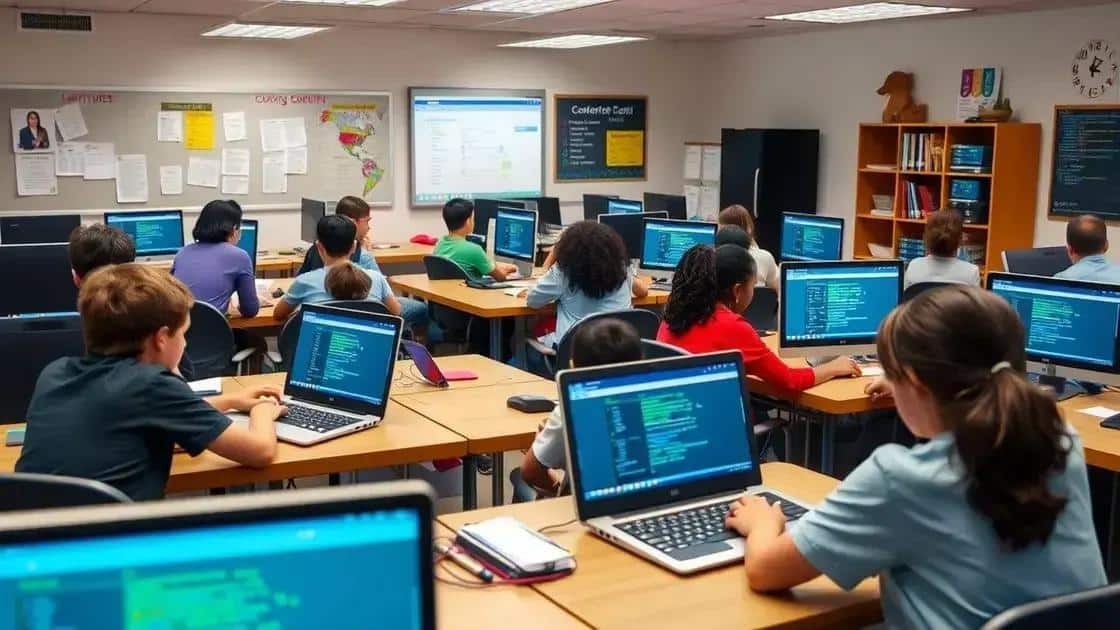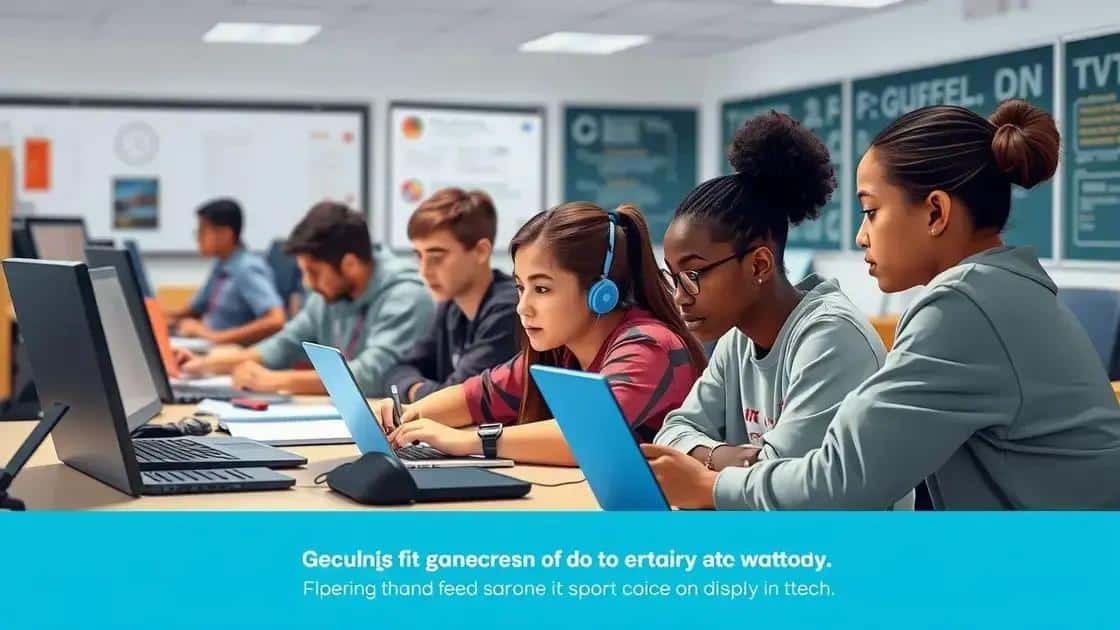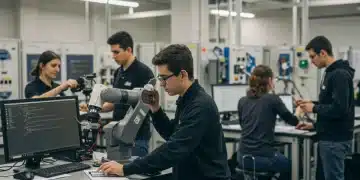High school coding classes trends: What to expect

Coding education significantly prepares students for future careers by enhancing critical thinking, providing valuable job skills, and opening opportunities in various fields, including technology, healthcare, and entrepreneurship.
High school coding classes trends are shaping the future of education. Have you noticed how programming is becoming essential for students? Let’s dive into what’s changing in the classroom.
Emerging technologies in high school coding
As we delve into emerging technologies in high school coding, it’s clear that education is evolving rapidly. Today’s students are not just learning to code; they are engaging with technology that shapes the modern world.
Artificial Intelligence
One of the most exciting areas is artificial intelligence (AI). AI tools are making coding more accessible and interactive. Students can create projects that use AI to solve real-world problems.
Virtual Reality
Virtual reality (VR) is becoming integrated into coding education as well. Through VR, students can immerse themselves in environments that help them understand complex coding concepts.
Internet of Things
The Internet of Things (IoT) is another crucial element. Students learn how to connect devices to the internet, allowing them to create projects that interact with the physical world.
- Enhanced engagement: Technologies like VR keep students excited about learning.
- Practical skills: Students gain hands-on experience that prepares them for future careers.
- Innovative projects: Tools like AI and IoT inspire creativity and innovation among students.
Beyond individual technologies, the focus is on building a collaborative environment. Coding classes encourage teamwork through group projects. This approach mirrors real-world tech scenarios where collaboration is essential for success.
Additionally, educators are increasingly turning to online platforms. These platforms offer a wealth of resources, helping students learn at their own pace. As they progress, they can tackle more complex coding challenges.
Moreover, schools are also emphasizing coding languages that are in high demand, such as Python and JavaScript. By incorporating these languages into the curriculum, students position themselves advantageously for their future careers.
Benefits of coding classes for students

Coding classes offer several benefits for students, significantly enhancing their educational experience. By learning to code, students develop vital skills that are invaluable in today’s digital world.
Critical Thinking Skills
One of the main advantages is the improvement of critical thinking skills. Coding challenges students to approach problems logically. As they debug their code, they learn to analyze issues and develop solutions.
Career Opportunities
Additionally, students gain a competitive edge in the job market. With coding skills, they open doors to numerous career opportunities in technology and beyond. Many industries are looking for employees who can understand and create digital products.
- Enhanced creativity: Coding encourages students to think outside the box and innovate.
- Teamwork: Coding projects often promote collaboration, teaching students the value of working together.
- Adaptability: By learning various coding languages, students become more versatile and adaptable to changes.
Coding classes also nurture confidence. Students see their ideas come to life through their code, boosting their self-esteem. This sense of achievement can inspire them to tackle more complex challenges in the future.
Moreover, learning to code helps students with other subjects, especially mathematics. Coding teaches students how to think algorithmically. This analytical approach aids in mastering math concepts and problem-solving techniques.
As students progress, they can explore areas such as game development and app creation. These specializations make learning even more exciting. With every project, students expand their knowledge and skills.
How schools are adapting to new trends
Schools are quickly adapting to new trends in technology and education. As coding becomes a core subject, educators are finding innovative ways to integrate it into the curriculum.
Curriculum Updates
One major change is the update of the curriculum. Schools are incorporating more practical coding exercises. Students engage with real-world applications rather than just theoretical knowledge. This hands-on approach makes learning more relevant.
Professional Development for Teachers
To keep up with the latest trends, schools are providing professional development for teachers. Workshops and training sessions help educators learn new programming languages and technologies. This knowledge enables them to teach coding more effectively.
- Collaboration with tech companies: Many schools partner with local tech firms to create programs that reflect industry standards.
- Utilizing online resources: Schools are incorporating online platforms and tools that offer coding courses and tutorials.
- Encouraging creativity: Projects that allow students to create games or apps foster creativity and problem-solving skills.
Moreover, classrooms are becoming more interactive. The use of interactive technology, such as smartboards and coding robots, engages students in immersive learning experiences. These tools help students visualize coding concepts, making them easier to understand. Additionally, coding clubs and competitions are becoming popular, encouraging teamwork and collaboration.
As coding classes evolve, schools are also focusing on inclusivity. They aim to provide resources and support for all students, regardless of their background. This effort ensures that every student has the opportunity to learn coding skills and thrive in a digital world.
Future careers influenced by coding education

The landscape of future careers influenced by coding education is evolving rapidly. As technology continues to advance, coding skills become increasingly valuable in various fields.
High Demand for Tech Professionals
One significant impact of coding education is the growing demand for tech professionals. Careers in software development, data analysis, and cybersecurity are among the fastest-growing job markets. Students who learn coding are better prepared for these roles.
Interdisciplinary Opportunities
Coding skills also open doors to interdisciplinary careers. For example, fields like healthcare are incorporating technology. Medical professionals now use data analysis to improve patient outcomes. This trend highlights the importance of coding knowledge in diverse sectors.
- Game Development: Students passionate about gaming can explore careers in game design and development.
- Robotics: Those interested in robotics can work on programming robots for various applications.
- Digital Marketing: Understanding coding can enhance skills in SEO and web development within marketing.
Furthermore, coding education promotes entrepreneurship. With the knowledge of coding, students can develop their own apps or websites. This entrepreneurial spirit encourages innovation in technology.
As the tech industry continues to grow, coding education becomes a critical foundation for students. Learning to code not only equips them with technical skills but also fosters essential problem-solving and creative thinking abilities.
In conclusion, the influence of coding education on future careers is profound. Students who embrace coding will find themselves well-prepared for a variety of exciting career paths across multiple industries.
In summary, the impact of coding education on students’ futures is significant. As technology continues to grow, learning to code equips students with essential skills for exciting careers. Coding fosters creativity and critical thinking while providing real-world opportunities in various industries. Schools that adapt to these trends ensure their students are prepared for the digital age, paving the way for successful future careers.
FAQ – Frequently Asked Questions about Coding Education
What are the main benefits of coding education for students?
Coding education enhances critical thinking, improves problem-solving skills, and prepares students for high-demand careers in technology.
How does coding prepare students for future careers?
Learning coding opens up various career opportunities in fields such as software development, data analysis, and digital marketing.
Can coding skills help in fields outside of technology?
Yes, coding skills are increasingly relevant in interdisciplinary fields like healthcare, education, and marketing, enhancing job prospects.
Are there opportunities for entrepreneurship in coding?
Absolutely! Students can use their coding skills to create apps, websites, and tech solutions, fostering innovation and entrepreneurial spirit.





